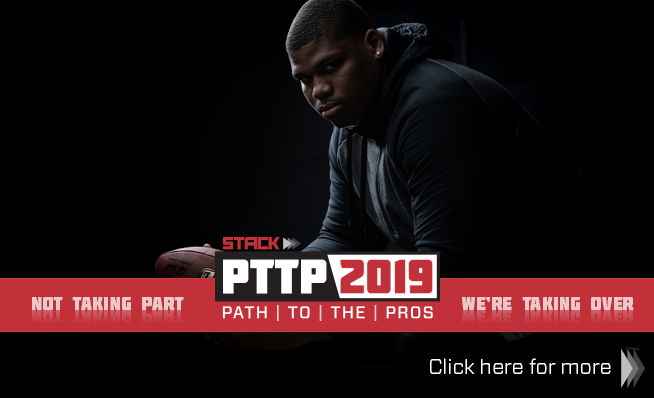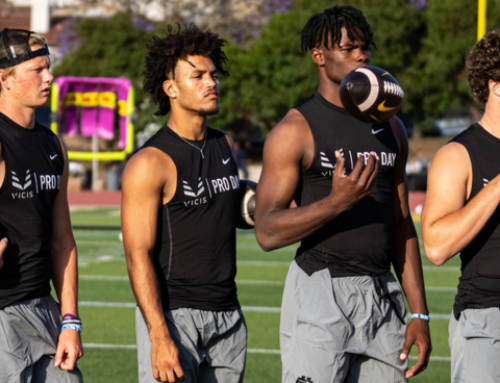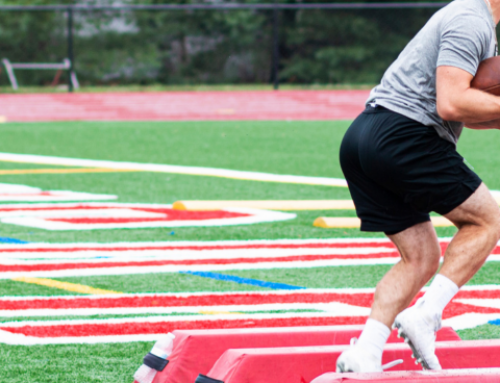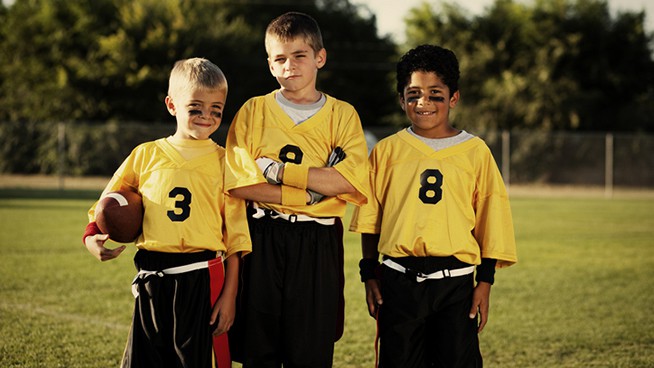Why David Montgomery Runs So Hard
“Ma, pull over. Pull over!”
David Montgomery throws open the side door, yanks off his seat belt, and spews the contents of his stomach onto the asphalt. He wipes off his mouth and slumps back into his seat, his shirt damp with sweat. The vehicle slowly trudges ahead, picking up its familiar route back home. The next day, David may do this to himself again. The thought of a broken promise was far more excruciating than an upset stomach.
“My mom was so worried about my education, making sure I get into college and figuring out the money to do it, but I promised her, ‘Mom, you’re never going to have to pay for me to go to college,” Montgomery recalls. “The offseason my junior year, I just killed it. Everyday, just killing myself. I ain’t taking no time off. Go training at the Art of Fitness in Cincinnati. Go in there and kill it every time I could. Making sure I left everything out there, nothing in the tank. I’d throw up at the workouts. I’d go in the car, my mom had to stop the car—I’m throwing up. Because I’m just going. I’m just so driven to make sure my momma don’t pay for college.”
Four years later, Montgomery’s in line for a multi-million dollar payday as one of the top running back prospects for the 2019 NFL Draft. His running style is akin to his life path—no matter how many times you hit him, no matter how impossible his escape appears to be, he finds a way out. Growing up in an impoverished neighborhood of Cincinnati, Montgomery quickly adapted to life without luxuries. When the heat got shut off, the family cracked the oven to stay warm. When the water got turned off, they’d haul back gallons from the local Safeway, heat them up on the stove top, then pour them in the tub.
“We were poor. But we made do with what we had. My mom, she told me that you’re not going into the streets. You’re not going to be another statistic. I didn’t understand it when I was younger. But as I grew up, I began to see what a statistic actually was,” Montgomery says.
Football became a natural outlet.
“The fun thing about it for me was being able to get out of everything back home and taking my mind away from everything. And being able to hit other kids without getting in trouble,” Montgomery says.

Raised in a large family, his older siblings liked to roughhouse. Grappling with bigger, stronger family members helped him morph into something of a man-child. When he competed for Mount Healthy High School’s track and field team, opponents were incredulous when he showed up for the throwing events. “I was a little guy. Everybody else around me was towering—bigger, stockier, D-linemen, O-linemen. They’d look at me and laugh. I kinda just laugh too, because I knew how explosive and powerful I was,” Montgomery says.
His shot put PR of 52-5.5 remains a school record, as does his 168-1 PR in the discus.
Outside of sports, Montgomery had another outlet—Boy Scouts. When he was first signed up by his mother, Roberta Mitchell, he loathed the idea. “I thought it was lame. I thought the kids around me wouldn’t think it was cool. At first I dreaded it, I hated going to camp, hated doing popcorn, hated it all. But as I started to go on with it, doing other things, doing outdoor things, I started to enjoy it,” Montgomery says.
He soon found himself going far beyond the bare minimum, rising all the way to Eagle Scout, the organization’s highest attainable rank. Only 4 percent of Boy Scouts go on to become Eagle Scouts. “You learn so much about health, survival, leadership. Being a Boy Scout to becoming an Eagle Scout was an experience I needed for me. It also influenced my mindset and the way I carry myself every day,” Montgomery says.
On the football field, Montgomery was the engine of Mount Healthy’s offense. As a dual-threat quarterback, he racked up 1,951 rushing yards and 22 touchdowns his junior year. He figured the gaudy stats would lead to an avalanche of offers. “The recruiting experience was exhausting, miserable. I valued my worth higher than what it was. I wasn’t ranked very high,” Montgomery says. “Going into my junior year, I knew I had to have a big year. I had a big year. The following offseason, I was like, ‘OK, the offers are gonna be rolling in.’ I thought wrong.”
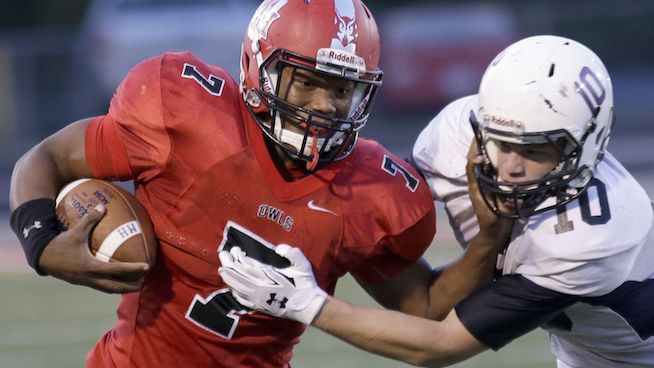
Photo via USA Today HSS
He received offers from two MAC schools, but those were quickly pulled when he didn’t immediately commit. At every opportunity, he pushed himself physically until the anger of being ignored disintegrated into exhaustion.
When Montgomery showed up to a satellite camp hosted by the University of Toledo that summer, he was in astonishing shape. Camping as a running back, he put on a jaw-dropping performance. During his final rep, Montgomery stamped an exclamation point on his performance by burning a highly ranked linebacker on an out-and-up route. Matt Campbell, the head coach at Toledo at that time, says it’s the best camp by a running back he’s ever seen. But Toledo had no more running back offers to grant. Campbell promised Montgomery he would figure something out and come back for him, but Montgomery left the camp empty-handed. “I was like shattered, heartbroken. But I knew who my God was,” Montgomery says.
His masochistic work ethic elevated his confidence to the point he felt no opponent had the right to take him down. “The will for me (not) to go down grew, as far as running the ball. It wasn’t easy for people to tackle me and I took confidence and a lot of pride in that,” Montgomery says. “Senior year, I took off, numbers were crazy.”
Montgomery rushed for 2,707 yards and 41 touchdowns en route to Division III Ohio Player of the Year honors. He averaged a preposterous 10.1 yards per carry. Equal parts elusive and powerful, his opponents were grasping for air one play, only to take a sledgehammer to the sternum the next.
Yet the offers still did not appear. Several opportunities seemed to materialize, only to be yanked out from underneath him. Convinced he may have to pay for his own college, Montgomery began picking up shifts at a local McDonald’s. But when Campbell became the new head coach at Iowa State, one of his first calls was to David. He offered a scholarship, and that one stuck. After visiting the campus with his mother, Montgomery was sold. He’d take his talents to Ames, Iowa.
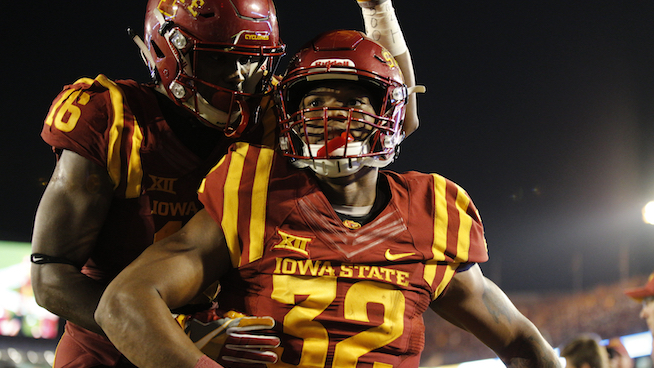
By mid-season his freshman year, Montgomery had snatched a starting spot. In his second career start, he unleashed for 169 yards in a win over Kansas. Two weeks later, he went off for 141 yards in the season finale against West Virginia. By January, he was one of the most respected members of the team. Montgomery put in so much extra work Campbell often locked the facility in a futile attempt to keep him rested.
“I found a way in. Can’t stay away from the grind,” Montgomery says.”I’d come in late (at) night just because one, I wasn’t really a party guy. I didn’t go with the hype. I was OK with doing things by myself and standing alone to do things that I needed to do to improve myself.”
Often training into the wee hours of the morning, he utilized cone drills to sharpen his cuts, caught tennis balls to improve hand-eye coordination, and pulled sleds to enhance his bullish power. He became a film room junkie, religiously visiting the facility after a game or practice to analyze his own performance and get a jump on what’s next. “Four or five years ago, I was watching film of me—it was more like highlights. I wasn’t really paying attention to what I wasn’t doing well. I grew a fine understanding that I had to pay attention to the things I (wasn’t) doing well, because those matter more,” Montgomery says. Over time, teammates began following his lead. The culture of a program who’d seen just one winning season since 2005 started to shift.
In his sophomore season, Montgomery slashed, smashed and sped his way to 1,146 rushing yards and 11 touchdowns. At a glance, the numbers don’t look all that spectacular—36 other D1 players rushed for more yardage. However, advanced statistics reveal it to be one of the most remarkable seasons in recent memory. A staggering 885 of his 1,146 yards came after contact, and his 109 broken tackles were the highest single-season total ever tracked by Pro Football Focus. Montgomery earned First-Team All-American honors from PFF and was named First-Team All-Big 12. Most importantly, he helped the Cyclones win eight games—a feat they hadn’t accomplished since 2000.
Montgomery believes practice is about two things—having fun, and getting 1 percent better. He never wants to lose sight of the former, even if he does prepare like every carry is a matter of life and death. “I don’t need 15, 25 percent. Let’s get 1 percent better every day and focus on making the people around me better,” Montgomery says. “(I also gotta) remember that the game I play is a game, and it’s supposed to be fun.”
It was more of the same in his junior campaign, as Montgomery again led the Cyclones to eight wins while racking up 1,216 rushing yards and 13 touchdowns. He was again a PFF First-Team All-American as well as a First-Team All-Big 12 selection. Montgomery did big things off the field, too, earning Academic All-Big 12 recognition and finishing as a semifinalist for the Jason Witten Man of the Year award. His friendship with a child named Hunter Erb, a young Cyclone fan born with multiple congenital heart defects, is a heartwarming story.
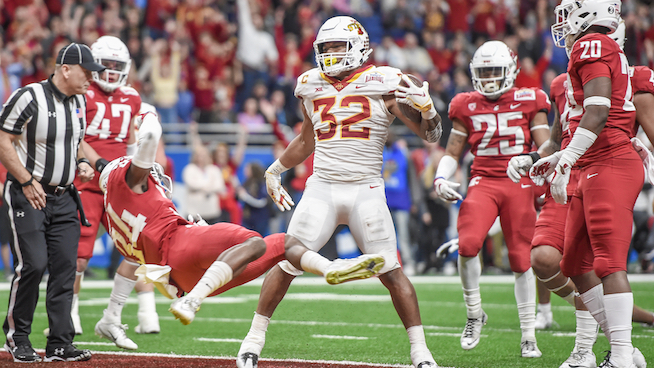
With nothing left to prove in college, Montgomery set his sights on the National Football League. He clocked a 4.57 40-Yard Dash at his Pro Day after training at XPE Sports in Boca Raton, Florida, a strong time for a 222-pound back with bruising power. “Mentally and skill-wise on the field, (he’s) put together as good as anyone we’ve seen,” says Tony Villani, owner of XPE Sports.
As he waits to hear his name called during the 2019 NFL Draft, which could happen as early as the first round, he’ll continue to do what got him here. Work hard. Pray. Give back. Repeat. He says it’s the potential to be “way better” than he is right now that keeps driving him.
When Montgomery does take a moment for himself, it’s usually at the end of a fishing rod. When he first got introduced to the hobby through Boy Scouts, he didn’t have the patience to understand its appeal. But over time, he’s become a fanatic. His viewing history on Netflix is littered with fishing shows, with his current favorite being Hardliners, a reality series on fishermen who brave treacherous waters angling for high-profit tuna and swordfish. “I started in scouts, took a fly fishing class. Wasn’t the best at fly fishing, being angry. But as I started to learn technique, I got better with it. Then I started to go real fishing,” Montgomery says. “I went to buy my own rod. (That) turned to two rods, five rods, 10 rods. Going from different lures and live bait, dead bait, chum, all kind of baits to catch different type of fish. Catching walleye, catfish, catching bluegill, smaller fish, wild bass…I like to relax and chill and go fishing, I’m not a party guy. I’d rather go fishing on a nice little boat.”
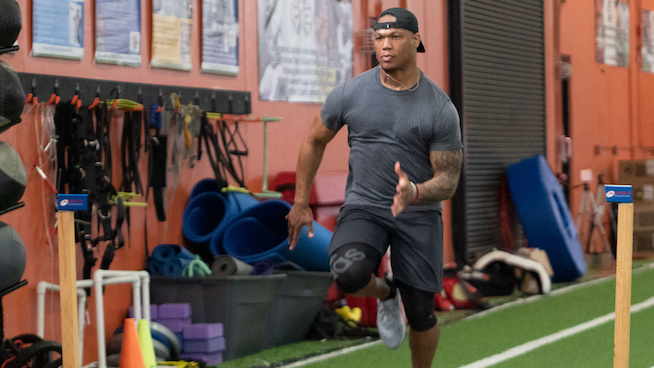
When he gears up for battle on game days, Montgomery inks “RIP V” on his wrist tape to honor Vince Turnage, a late friend and role model who was a standout athlete at Mount Healthy before being murdered during a home invasion. Montgomery’s own brother, Maceo Feltha, is a living reminder of a path not taken. He’s currently serving 15 years to life in the Madison Correctional Institute in London, Ohio. For the past several years, David’s sent him money for use in the commissary. On the verge of his NFL dream, Montgomery talks about inspiring future generations, showing kids who come from places like he does life is not a dead end.
“I love football today because it changed my life. Saved my life. Helped me,” Montgomery says. “I’m not supposed to be here, if you let everybody else tell it. God knows I’m supposed to be here, but everybody else don’t think I’m supposed to be here.”
Photo Credit: David K. Purdy/Getty Images, Icon Sportswire/Getty Images
RECOMMENDED FOR YOU
MOST POPULAR
Why David Montgomery Runs So Hard
“Ma, pull over. Pull over!”
David Montgomery throws open the side door, yanks off his seat belt, and spews the contents of his stomach onto the asphalt. He wipes off his mouth and slumps back into his seat, his shirt damp with sweat. The vehicle slowly trudges ahead, picking up its familiar route back home. The next day, David may do this to himself again. The thought of a broken promise was far more excruciating than an upset stomach.
“My mom was so worried about my education, making sure I get into college and figuring out the money to do it, but I promised her, ‘Mom, you’re never going to have to pay for me to go to college,” Montgomery recalls. “The offseason my junior year, I just killed it. Everyday, just killing myself. I ain’t taking no time off. Go training at the Art of Fitness in Cincinnati. Go in there and kill it every time I could. Making sure I left everything out there, nothing in the tank. I’d throw up at the workouts. I’d go in the car, my mom had to stop the car—I’m throwing up. Because I’m just going. I’m just so driven to make sure my momma don’t pay for college.”
Four years later, Montgomery’s in line for a multi-million dollar payday as one of the top running back prospects for the 2019 NFL Draft. His running style is akin to his life path—no matter how many times you hit him, no matter how impossible his escape appears to be, he finds a way out. Growing up in an impoverished neighborhood of Cincinnati, Montgomery quickly adapted to life without luxuries. When the heat got shut off, the family cracked the oven to stay warm. When the water got turned off, they’d haul back gallons from the local Safeway, heat them up on the stove top, then pour them in the tub.
“We were poor. But we made do with what we had. My mom, she told me that you’re not going into the streets. You’re not going to be another statistic. I didn’t understand it when I was younger. But as I grew up, I began to see what a statistic actually was,” Montgomery says.
Football became a natural outlet.
“The fun thing about it for me was being able to get out of everything back home and taking my mind away from everything. And being able to hit other kids without getting in trouble,” Montgomery says.

Raised in a large family, his older siblings liked to roughhouse. Grappling with bigger, stronger family members helped him morph into something of a man-child. When he competed for Mount Healthy High School’s track and field team, opponents were incredulous when he showed up for the throwing events. “I was a little guy. Everybody else around me was towering—bigger, stockier, D-linemen, O-linemen. They’d look at me and laugh. I kinda just laugh too, because I knew how explosive and powerful I was,” Montgomery says.
His shot put PR of 52-5.5 remains a school record, as does his 168-1 PR in the discus.
Outside of sports, Montgomery had another outlet—Boy Scouts. When he was first signed up by his mother, Roberta Mitchell, he loathed the idea. “I thought it was lame. I thought the kids around me wouldn’t think it was cool. At first I dreaded it, I hated going to camp, hated doing popcorn, hated it all. But as I started to go on with it, doing other things, doing outdoor things, I started to enjoy it,” Montgomery says.
He soon found himself going far beyond the bare minimum, rising all the way to Eagle Scout, the organization’s highest attainable rank. Only 4 percent of Boy Scouts go on to become Eagle Scouts. “You learn so much about health, survival, leadership. Being a Boy Scout to becoming an Eagle Scout was an experience I needed for me. It also influenced my mindset and the way I carry myself every day,” Montgomery says.
On the football field, Montgomery was the engine of Mount Healthy’s offense. As a dual-threat quarterback, he racked up 1,951 rushing yards and 22 touchdowns his junior year. He figured the gaudy stats would lead to an avalanche of offers. “The recruiting experience was exhausting, miserable. I valued my worth higher than what it was. I wasn’t ranked very high,” Montgomery says. “Going into my junior year, I knew I had to have a big year. I had a big year. The following offseason, I was like, ‘OK, the offers are gonna be rolling in.’ I thought wrong.”

Photo via USA Today HSS
He received offers from two MAC schools, but those were quickly pulled when he didn’t immediately commit. At every opportunity, he pushed himself physically until the anger of being ignored disintegrated into exhaustion.
When Montgomery showed up to a satellite camp hosted by the University of Toledo that summer, he was in astonishing shape. Camping as a running back, he put on a jaw-dropping performance. During his final rep, Montgomery stamped an exclamation point on his performance by burning a highly ranked linebacker on an out-and-up route. Matt Campbell, the head coach at Toledo at that time, says it’s the best camp by a running back he’s ever seen. But Toledo had no more running back offers to grant. Campbell promised Montgomery he would figure something out and come back for him, but Montgomery left the camp empty-handed. “I was like shattered, heartbroken. But I knew who my God was,” Montgomery says.
His masochistic work ethic elevated his confidence to the point he felt no opponent had the right to take him down. “The will for me (not) to go down grew, as far as running the ball. It wasn’t easy for people to tackle me and I took confidence and a lot of pride in that,” Montgomery says. “Senior year, I took off, numbers were crazy.”
Montgomery rushed for 2,707 yards and 41 touchdowns en route to Division III Ohio Player of the Year honors. He averaged a preposterous 10.1 yards per carry. Equal parts elusive and powerful, his opponents were grasping for air one play, only to take a sledgehammer to the sternum the next.
Yet the offers still did not appear. Several opportunities seemed to materialize, only to be yanked out from underneath him. Convinced he may have to pay for his own college, Montgomery began picking up shifts at a local McDonald’s. But when Campbell became the new head coach at Iowa State, one of his first calls was to David. He offered a scholarship, and that one stuck. After visiting the campus with his mother, Montgomery was sold. He’d take his talents to Ames, Iowa.

By mid-season his freshman year, Montgomery had snatched a starting spot. In his second career start, he unleashed for 169 yards in a win over Kansas. Two weeks later, he went off for 141 yards in the season finale against West Virginia. By January, he was one of the most respected members of the team. Montgomery put in so much extra work Campbell often locked the facility in a futile attempt to keep him rested.
“I found a way in. Can’t stay away from the grind,” Montgomery says.”I’d come in late (at) night just because one, I wasn’t really a party guy. I didn’t go with the hype. I was OK with doing things by myself and standing alone to do things that I needed to do to improve myself.”
Often training into the wee hours of the morning, he utilized cone drills to sharpen his cuts, caught tennis balls to improve hand-eye coordination, and pulled sleds to enhance his bullish power. He became a film room junkie, religiously visiting the facility after a game or practice to analyze his own performance and get a jump on what’s next. “Four or five years ago, I was watching film of me—it was more like highlights. I wasn’t really paying attention to what I wasn’t doing well. I grew a fine understanding that I had to pay attention to the things I (wasn’t) doing well, because those matter more,” Montgomery says. Over time, teammates began following his lead. The culture of a program who’d seen just one winning season since 2005 started to shift.
In his sophomore season, Montgomery slashed, smashed and sped his way to 1,146 rushing yards and 11 touchdowns. At a glance, the numbers don’t look all that spectacular—36 other D1 players rushed for more yardage. However, advanced statistics reveal it to be one of the most remarkable seasons in recent memory. A staggering 885 of his 1,146 yards came after contact, and his 109 broken tackles were the highest single-season total ever tracked by Pro Football Focus. Montgomery earned First-Team All-American honors from PFF and was named First-Team All-Big 12. Most importantly, he helped the Cyclones win eight games—a feat they hadn’t accomplished since 2000.
Montgomery believes practice is about two things—having fun, and getting 1 percent better. He never wants to lose sight of the former, even if he does prepare like every carry is a matter of life and death. “I don’t need 15, 25 percent. Let’s get 1 percent better every day and focus on making the people around me better,” Montgomery says. “(I also gotta) remember that the game I play is a game, and it’s supposed to be fun.”
It was more of the same in his junior campaign, as Montgomery again led the Cyclones to eight wins while racking up 1,216 rushing yards and 13 touchdowns. He was again a PFF First-Team All-American as well as a First-Team All-Big 12 selection. Montgomery did big things off the field, too, earning Academic All-Big 12 recognition and finishing as a semifinalist for the Jason Witten Man of the Year award. His friendship with a child named Hunter Erb, a young Cyclone fan born with multiple congenital heart defects, is a heartwarming story.

With nothing left to prove in college, Montgomery set his sights on the National Football League. He clocked a 4.57 40-Yard Dash at his Pro Day after training at XPE Sports in Boca Raton, Florida, a strong time for a 222-pound back with bruising power. “Mentally and skill-wise on the field, (he’s) put together as good as anyone we’ve seen,” says Tony Villani, owner of XPE Sports.
As he waits to hear his name called during the 2019 NFL Draft, which could happen as early as the first round, he’ll continue to do what got him here. Work hard. Pray. Give back. Repeat. He says it’s the potential to be “way better” than he is right now that keeps driving him.
When Montgomery does take a moment for himself, it’s usually at the end of a fishing rod. When he first got introduced to the hobby through Boy Scouts, he didn’t have the patience to understand its appeal. But over time, he’s become a fanatic. His viewing history on Netflix is littered with fishing shows, with his current favorite being Hardliners, a reality series on fishermen who brave treacherous waters angling for high-profit tuna and swordfish. “I started in scouts, took a fly fishing class. Wasn’t the best at fly fishing, being angry. But as I started to learn technique, I got better with it. Then I started to go real fishing,” Montgomery says. “I went to buy my own rod. (That) turned to two rods, five rods, 10 rods. Going from different lures and live bait, dead bait, chum, all kind of baits to catch different type of fish. Catching walleye, catfish, catching bluegill, smaller fish, wild bass…I like to relax and chill and go fishing, I’m not a party guy. I’d rather go fishing on a nice little boat.”

When he gears up for battle on game days, Montgomery inks “RIP V” on his wrist tape to honor Vince Turnage, a late friend and role model who was a standout athlete at Mount Healthy before being murdered during a home invasion. Montgomery’s own brother, Maceo Feltha, is a living reminder of a path not taken. He’s currently serving 15 years to life in the Madison Correctional Institute in London, Ohio. For the past several years, David’s sent him money for use in the commissary. On the verge of his NFL dream, Montgomery talks about inspiring future generations, showing kids who come from places like he does life is not a dead end.
“I love football today because it changed my life. Saved my life. Helped me,” Montgomery says. “I’m not supposed to be here, if you let everybody else tell it. God knows I’m supposed to be here, but everybody else don’t think I’m supposed to be here.”
Photo Credit: David K. Purdy/Getty Images, Icon Sportswire/Getty Images

